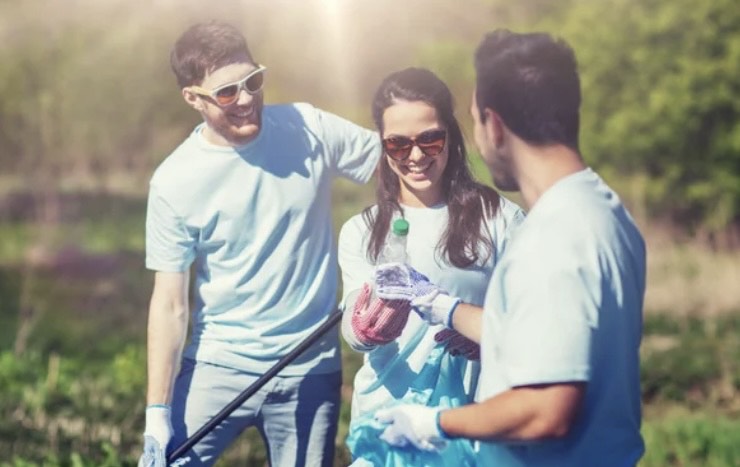Volunteer

What's involved?
The typical requests for assistance that we receive and provide are listed throughout this site.
We're always on the lookout for people with a range of interests and life and professional skills to help us serve our communities.
You could be a tradesperson, an organiser, a cleaner, a cook, an equipment operator, a gardener - anyone of a number of backgrounds who can offer their support to benefit others.
A typical day
Our volunteers will meet at a structured camp or central location at 7-8am, and report to a coordinator. Often breakfast will be provided during an attendance registration and daily agenda, and safety rundown occurs.
Following the safety rundown, troops will be assigned their jobs for the day and head out with their respective teams.
Upon arrival to the designated site location, a further safety analysis and site 'induction' occurs, prior to individual task allocation.
There will be a morning tea break and agreed lunch break (and sometimes an afternoon break) whilst going about the recovery tasks.
Depending on the recovery project, the work itself, and weather conditions, the day will usually continue until around 4pm.

General volunteering information
For insurance reasons, we can only allow volunteers over the age of thirteen (13). All volunteers under the age of eighteen (18) must be accompanied and supervised by a responsible person. There is no upper age limit; however, it's important to be mindful of the type of work to be done and the need to comply with direction and instruction from a Coordinator.
Insurance
Whilst working on an approved project/site, you are covered by our insurance. Volunteers are NOT covered when working on a project/site not authorised by us. Suppose a volunteer wishes to perform work outside of our approved work sites. In that case, they are advised to seek their own insurance, or ensure they are covered with a property owner's policy - we will not be liable or responsible for any injury/accident that occurs outside of our approved sites or authorised volunteer working times.
Ambulance Cover
In the event of an accident or injury, or a personal medical episode, we advise that volunteers should seek their own ambulance cover prior to volunteering. If a volunteer is from abroad (for example, a backpacker), it is strongly recommended that you consult with your travel insurer to ensure ambulance cover.
COVID
Though not mandatory, it is recommended that volunteers be vaccinated. If a volunteer suspects the onset of COVID, they can consult with the Coordinator, who will have RATs available. If COVID is confirmed, and due to our organisation's duty to protect our troops and the 'workplace', we may redeploy you into another role. We will encourage using a mask, distancing, and a volunteer choosing to isolate for a period. Disaster Recovery Army will support our troops as best we can. Each situation will be determined on its own merits. We will support our troops as best we can.
Recommended Protections
Some of the work we do involves clearing debris, so it is recommended that your Tetanus injections be up to date. There can be work in affected areas that attract mosquitoes, so it is recommended that you protect yourself from any bites or infection.
Work Days
We work seven (7) days a week, including on public holidays. No volunteer is permitted to work more than six (6) consecutive days - they must have a day off within a seven (7) day period.
Meals
While volunteering with us, we will provide all meals.
Accommodation
We work hard to arrange camp facilities with space for caravans, motorhomes, and tents. Toilet and shower facilities are provided. Sometimes, we are able to arrange accommodation for volunteers. If you require accommodation, please let a coordinator know.
Safety Equipment
We provide all personal protective equipment (PPE), with the exception of safety boots. Please ensure you have suitable steel-toed boots. Coordinators All volunteers are overseen by a competent and trained Coordinator. Any specific matters should be raised with the respective
Coordinator.
Each Coordinator runs the camp and the work "projects" in their own way, but under the organisational models. If you've volunteered previously, you can expect that your experiences between Coordinators may be different. We request that you respect differences in independent and unique coordinating.
Pets
If you have pets, we prefer that they be left with a responsible friend or family member and not taken to camps. If this is not possible, speak with the Coordinator in advance to determine suitability. Pets are NOT permitted on properties we work on. Our organisation will not be responsible for any pets, their welfare, or emergency (attack, snake bite etc).
Mental Health
Some disasters are not only traumatic to sufferers/victims, but also to volunteers. Respect and care for all is expected. We know the importance of mental health and can offer psychological and counselling sessions to volunteers through our partner network. Please speak with a Coordinator if you would like further information.
Volunteer Behaviour
We value our volunteer supporters highly. As such, we've created a Behaviour Charter that we go through in great detail upon registration at our camps and/or project sites. We have zero tolerance for verbal and physical abuse, illegal behaviour, drug use, and discrimination. We're also proud to be a stand-out organisation regarding respect for all.